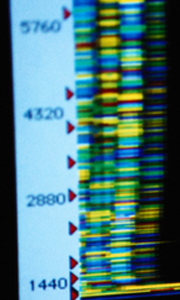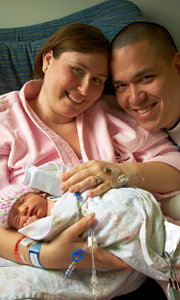Two Children’s Hospital physicians are blazing new trails in childhood cancer research and giving renewed hope to families across the country.
The first pediatric Dream Team of researchers, led by John M. Maris, MD, director of CHOP’s Center for Childhood Cancer Research (CCCR), will build on pioneering results realized by CCCR’s Director of Translational Research Stephan Grupp, MD, PhD, to treat childhood leukemia. These two researchers are actively involved in new classes of treatments to improve children’s survival and quality of life in the 21st century.
Dr. Grupp recently achieved groundbreaking results using an innovative T cell therapy to treat a patient with an aggressive form of childhood leukemia called acute lymphoblastic leukemia (ALL). The most common form of childhood leukemia and the most common childhood cancer, ALL is highly treatable for approximately 85 percent of cases. But the remaining 15 percent of such cases resist standard therapy.
Dr. Grupp’s work made all the difference for 7-year-old Emma Whitehead, whose prospects were bleak when her cancer relapsed after she received the conventional treatment for ALL. With few other viable options, Dr. Grupp turned to an experimental therapy using bioengineered T cells that were designed to multiply rapidly and destroy leukemia cells. In other words, Dr. Grupp reprogrammed Emma’s own immune cells to attack the ALL cells.
As the workhorses of the immune system, T cells recognize and attack invading disease cells. However, cancer cells fly under the radar of immune surveillance, evading detection by T cells. In what’s known as CTL019 therapy, CAR T cells (chimeric antigen receptor T cells) are engineered to specifically target B cells, which become cancerous in certain leukemias like ALL, as well as types of lymphoma, another cancer of the immune cells.
Amazingly, just three weeks after the treatment, Emma’s doctors found no traces of cancer. A year later, Emma remains healthy and cancer-free.
Such dramatic results bode well for successfully treating resistant cases of childhood ALL and possibly other types of cancer as well. “These engineered T cells have proven to be active in B cell leukemia in adults,” said Dr. Grupp. “We are excited to see that the CTL019 approach may be effective in untreatable cases of pediatric ALL as well. Our hope is that these results will lead to widely available treatments for high-risk B cell leukemia and lymphoma, and perhaps other cancers in the future.”
Emma received the therapy as part of a research clinical trial conducted by investigators at CHOP and the Perelman School of Medicine at the University of Pennsylvania. Recently, Dr. Grupp and the CHOP/Penn team have reported an 82 percent complete response rate in a study that has included 20 children — including Emma and one other pediatric patient — and 5 adults with ALL. A major update on this study will be presented at the upcoming American Society of Hematology annual meeting in December.
Emma was a guest of honor at the announcement of the first pediatric “Dream Team” of cancer researcher solely focused on creating new treatments for the most challenging childhood cancers. CHOP’s Dr. Maris was chosen to co-lead the Dream Team, which was announced at the American Association for Cancer Research annual meeting in Washington, D.C. Crystal L. Mackall, MD, chief of the Pediatric Oncology Branch of the National Cancer Institute, is the Dream Team’s other co-leader.
“The motivation for the creation of this collaborative research project is the realization that completely new strategies are needed if we are to have curative therapies for all childhood cancers,” said Dr. Maris. “Our team hopes to rapidly develop more precise and effective treatments based on the unique characteristics of each child’s tumor, here focusing on the genetic changes that make the cancer cells different from the rest of the child’s body.”
The Dream Team will receive $14.5 million in funding over 4 years, provided by Stand Up to Cancer (SUC2) and St. Baldrick’s Foundation. The research project, called “Immunogenomics to Create New Therapies for High-Risk Childhood Cancers,” melds two disciplines that have historically functioned independently: immunotherapeutics and genomics. The goal of the project is to rapidly translate promising basic research into transformative, targeted treatments that will improve cure rates in children’s cancer.
Recent research in genomics has shown that pediatric cancers are fundamentally different from adult cancers, explained Dr. Maris. Children’s cancers are less likely to arise due to recurring mutations that can be countered with small molecule drugs. Instead, the Dream Team will exploit the unique feature of molecules on cell surfaces of childhood cancer cells that are not present on normal cells, and offer targets for treatments employing bioengineered agents working through the immune system.
“The success of the program will ultimately be judged by the number of lives saved through our efforts,” said Dr. Maris.
The Dream Team will take on the four most deadly pediatric cancers: malignant brain tumors, high-risk leukemias (such as the type of ALL that Emma had), neuroblastomas (which affect the peripheral nervous system), and sarcomas (other tumors of bone and other tissue). Dr. Grupp and Tom Curran, PhD, FRS, deputy director of the CHOP Research Institute, will lead the CHOP-based research efforts.














